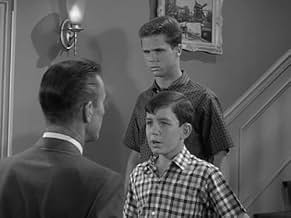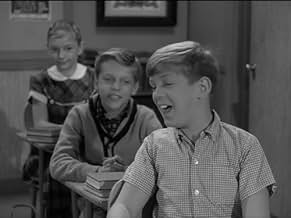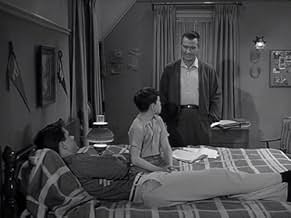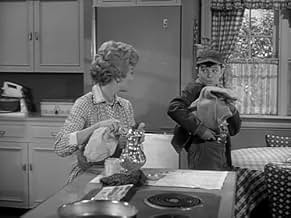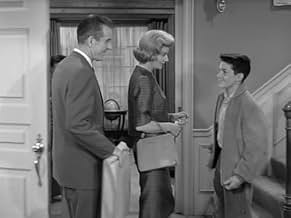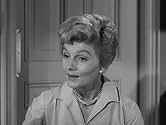Die Missgeschicke eines Vorstadtjungen, seiner Familie und Freunde.Die Missgeschicke eines Vorstadtjungen, seiner Familie und Freunde.Die Missgeschicke eines Vorstadtjungen, seiner Familie und Freunde.
- Für 2 Primetime Emmys nominiert
- 5 Gewinne & 4 Nominierungen insgesamt
Folgen durchsuchen
Empfohlene Bewertungen
It is easy to criticize "Leave it to Beaver" today for being an overly romanticized look at family life in the late 50s/early 60s. Because, well, it is an overly romanticized look at family in the late 50s/early 60s. But so what? This is a well written, well acted sitcom. I love it for the show that it is and I don't worry about the more realistic show it could have been.
Ward and June Cleaver are raising two sons: Wally and Theodore, who everyone calls by the nickname "Beaver." (To answer an earlier reviewer, the nickname came from older brother Wally who couldn't pronounce "Theodore" when his little brother was born, instead pronouncing it "Beaver.)
Beaver is definitely not a Bart Simpson, constantly making trouble and outwitting his dad. No, Beaver is a kid who gets into trouble usually because one of his friends (Larry, Richard or Gilbert) talks him into it. It is then usually up to Ward to help straighten the situation out and gently but firmly teach Beaver the lesson to be learned.
Wally and June are equally as important. Wally is the older brother we all wish we had. And who else but June could look so perfect while fixing up a batch of our favorite cookies?
One of the biggest reasons why the show was popular then and is still popular today, however, is the supporting cast. Eddie Haskell. ("And might I add Mrs. Cleaver, that is a lovely blouse you are wearing.") Fred Rutherford. ("See you in the salt mines, Ward.") Larry Mondello. Miss Landers. Mary Ellen Rogers. Gus the Fireman. All have endured for more than 40 years and become permanent fixtures in our pop culture.
Overly romanticized? Sure. But so what. Years from now when people have forgotten almost all of the sitcoms airing today, The Beaver will still be bringing smiles to our faces.
Ward and June Cleaver are raising two sons: Wally and Theodore, who everyone calls by the nickname "Beaver." (To answer an earlier reviewer, the nickname came from older brother Wally who couldn't pronounce "Theodore" when his little brother was born, instead pronouncing it "Beaver.)
Beaver is definitely not a Bart Simpson, constantly making trouble and outwitting his dad. No, Beaver is a kid who gets into trouble usually because one of his friends (Larry, Richard or Gilbert) talks him into it. It is then usually up to Ward to help straighten the situation out and gently but firmly teach Beaver the lesson to be learned.
Wally and June are equally as important. Wally is the older brother we all wish we had. And who else but June could look so perfect while fixing up a batch of our favorite cookies?
One of the biggest reasons why the show was popular then and is still popular today, however, is the supporting cast. Eddie Haskell. ("And might I add Mrs. Cleaver, that is a lovely blouse you are wearing.") Fred Rutherford. ("See you in the salt mines, Ward.") Larry Mondello. Miss Landers. Mary Ellen Rogers. Gus the Fireman. All have endured for more than 40 years and become permanent fixtures in our pop culture.
Overly romanticized? Sure. But so what. Years from now when people have forgotten almost all of the sitcoms airing today, The Beaver will still be bringing smiles to our faces.
Leave it to beaver is remarkable. i still wonder why people never make clean humored shows like this. all it is on TV nowadays is sexual jokes and just plain old B.A.D.
Theodore "beaver" cleaver is the average American boy. he likes baseball, he has an older brother, and he's got friends who are total dummies. and he's always doing something, and learning something at the same time, with a little humor and funny comments you only find in readers digest.
when i heard of this show at first, i thought it was a normal show, but when i saw it for the first time last summer, i thought it was hilarious! if you remember the show from the 50's and 60's, NowTV has it at 6:30 every weekday. if you haven't seen it, you should. then you'll know what a real family show is.
this is a 10/10, dude
Theodore "beaver" cleaver is the average American boy. he likes baseball, he has an older brother, and he's got friends who are total dummies. and he's always doing something, and learning something at the same time, with a little humor and funny comments you only find in readers digest.
when i heard of this show at first, i thought it was a normal show, but when i saw it for the first time last summer, i thought it was hilarious! if you remember the show from the 50's and 60's, NowTV has it at 6:30 every weekday. if you haven't seen it, you should. then you'll know what a real family show is.
this is a 10/10, dude
During a recent TVLand "Top 10 Characters You Love To Hate" special, a well-known (under 40) female actress was quoted as saying that she believed sneaky Eddie Haskell to be the only character in the show that she remembered for resembling "a real person".
Though I'll agree that Ward and June might come across at times as being unrealistically conservative (for example, their sitting at home in their Sunday best for no reason) her comment was something I found hard to understand, since, Beaver was known to be the first show of it's kind to explore such teen issues as, alcoholism, divorce, and troubled teens.
It seems that many viewers also do not understand the significance of Ward's frequent reference (often shown as his sad remembrance) to his own harsh encounters with his strict Father, who made a point of "taking him out to the woodshed" to let Ward know "just what his Father meant", and how Ward, as a Father himself, deciding that he would not do the same when teaching his own sons right from wrong.
While the conservative side of the show might be a bit too much for some, in the end there is nothing wrong with that behavior either - it's a far better lifestyle than what we see in today's world, where parents sometimes see their children as a liability rather than a blessing.
Those who regularly watch Beaver know that while the corn does sometimes grow high in Mayfield, the trueness of the show's stories is what makes Beaver the timeless show that many still enjoy almost a half century after it's debut.
Though I'll agree that Ward and June might come across at times as being unrealistically conservative (for example, their sitting at home in their Sunday best for no reason) her comment was something I found hard to understand, since, Beaver was known to be the first show of it's kind to explore such teen issues as, alcoholism, divorce, and troubled teens.
It seems that many viewers also do not understand the significance of Ward's frequent reference (often shown as his sad remembrance) to his own harsh encounters with his strict Father, who made a point of "taking him out to the woodshed" to let Ward know "just what his Father meant", and how Ward, as a Father himself, deciding that he would not do the same when teaching his own sons right from wrong.
While the conservative side of the show might be a bit too much for some, in the end there is nothing wrong with that behavior either - it's a far better lifestyle than what we see in today's world, where parents sometimes see their children as a liability rather than a blessing.
Those who regularly watch Beaver know that while the corn does sometimes grow high in Mayfield, the trueness of the show's stories is what makes Beaver the timeless show that many still enjoy almost a half century after it's debut.
A TV Sitcom from the late 50's featuring the every day life of a family that was funny and sometimes absolutely hilarious. Not all the family oriented shows from this period could boast this. Even after nearly forty years since it ended it's run the shows remain un-dated and still great. (Much like the legendary I Love Lucy) The friends of Wally and Beaver and June and Ward were really what made the show a classic. Lumpy Rutherford and his dad Fred, Whitey, Richard, Gilbert, Larry Mondello and of course
.. Eddie Haskell! As far as I'm concerned the reruns of this classic show could be broadcast on prime time and I'd watch it in favor of todays sitcoms.
When I was young, way back in the 1960's I never really dug this show. It was too 'predictable'. In the first five minutes we meet the Cleavers, then in the next 15, Beaver has screwed up, and the last few minutes of the show, we get a good lesson on 'cause and effect' from Ward. Everybody laughs, credits roll, and we get to see Wally and Beaver walking home and a brand new De Soto go by in the street (Chrysler, replacing Ford Motor Company, sponsored the show from about 1959, onward and used the closing credits to get a product placement shot in.) And as I was a kid at the time, I never enjoyed seeing other kids get into trouble.
Now that I'm in my forties, I find the show hysterical. The exasperated look that Ward and June get when something happens, Wally's comments, and the dealings with all the Cleavers friends are priceless.
Wally's come backs of 'Aw, heck, Beaver', and 'Don't be a creep, or something.' Crack me up. You can always count on a great line from Tony Dow in every episode.
The story lines were fairly typical fifties fluff, with a few exceptions. There is one that deals with an alcoholic handyman that Ward knows, that frankly could be re-shot today, and not feel 40 plus years old. I recently saw one, where Beaver joins a record club, and forgets to send back a card to cancel the next shipment of records. Hands up, out there, how many of us do that today with our CD and DVD club selection cards?
A true, kindhearted, and well written classic to be enjoyed by the whole family.
Now that I'm in my forties, I find the show hysterical. The exasperated look that Ward and June get when something happens, Wally's comments, and the dealings with all the Cleavers friends are priceless.
Wally's come backs of 'Aw, heck, Beaver', and 'Don't be a creep, or something.' Crack me up. You can always count on a great line from Tony Dow in every episode.
The story lines were fairly typical fifties fluff, with a few exceptions. There is one that deals with an alcoholic handyman that Ward knows, that frankly could be re-shot today, and not feel 40 plus years old. I recently saw one, where Beaver joins a record club, and forgets to send back a card to cancel the next shipment of records. Hands up, out there, how many of us do that today with our CD and DVD club selection cards?
A true, kindhearted, and well written classic to be enjoyed by the whole family.
Wusstest du schon
- WissenswertesAlthough the series was still earning good ratings, its star, Jerry Mathers, wanted to retire from acting to focus on his education upon entering high school. As a result, it was agreed to halt production and the series became the first prime time American production to have a series finale.
- PatzerDuring season one, Wally was in 8th grade and Beaver was in 2nd - six years apart. By the end season six Beaver was finishing 8th grade and Wally was graduating high school - 4 years apart.
- Zitate
June Cleaver: Wally, where are you going?
Wally Cleaver: I'm going over to slug Eddie.
June Cleaver: That's no way to talk, this is Sunday.
Wally Cleaver: You're right, I'll wait 'til tomorrow and slug him in the cafeteria.
- Crazy CreditsThe actor who plays "Beaver" is always credited at the beginning of the show as "And Jerry Mathers...as The Beaver".
- VerbindungenFeatured in Prime Times (1983)
Top-Auswahl
Melde dich zum Bewerten an und greife auf die Watchlist für personalisierte Empfehlungen zu.
Details
- Erscheinungsdatum
- Herkunftsland
- Offizieller Standort
- Sprache
- Auch bekannt als
- Leave It to Beaver
- Drehorte
- Produktionsfirmen
- Weitere beteiligte Unternehmen bei IMDbPro anzeigen
- Laufzeit
- 30 Min.
- Farbe
- Sound-Mix
- Seitenverhältnis
- 4:3
Zu dieser Seite beitragen
Bearbeitung vorschlagen oder fehlenden Inhalt hinzufügen




